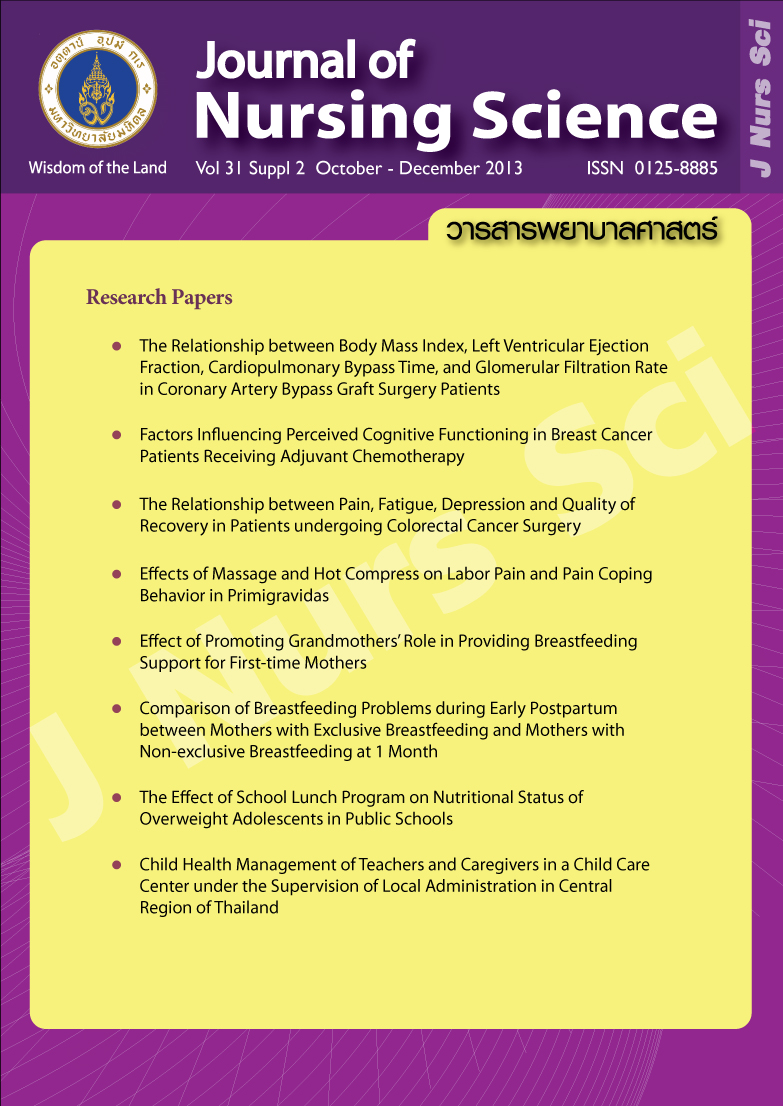The Relationship between Pain, Fatigue, Depression and Quality of Recovery in Patients undergoing Colorectal Cancer Surgery
Main Article Content
Abstract
Purpose: To determine the relationship between pain, fatigue, depression and quality of recovery in patients undergoing colorectal cancer surgery.
Design: A descriptive correlational design.
Methods: The study sample consisted of 85 patients undergoing elective open abdominal colorectal cancer surgery aged 18 years and older who received general analgesia during the surgery and who were admitted into the surgical wards at three tertiary hospitals in Bangkok, namely Siriraj Hospital, Ramathibodi Hospital, and Bhumibol Adulyadej Hospital. Data were collected between April and August, 2013. The instruments used in data collection included the Demographic Characteristics Questionnaire and the Illness and Treatment Questionnaire, the numeric pain scale, the Modified Fatigue Symptom Checklist, the Center for Epidemiologic Studies-Depression Scale, and the Quality of Recovery Questionnaire. Data were analyzed by means of descriptive statistics and Pearson’s productmoment correlation coefficient.
Main findings: The study findings revealed that fatigue and depression were negatively related to quality of recovery in patients undergoing colorectal cancer surgery at moderate and low levels with statistical significance (r = - .592, r = - .377, p < .01), respectively. However, there was no relationship between pain and quality of recovery in patients undergoing colorectal cancer surgery (r = - .057, p > .05).
Conclusion and recommendations: Nurses should cooperatively work to develop the guideline for holistic nursing practice by utilizing management of fatigue and depression to promote quality of recovery in patients receiving colorectal cancer surgery.
ความสัมพันธ์ระหว่างความปวด อาการอ่อนล้า ภาวะซึมเศร้า กับคุณภาพการฟื้นตัวของผู้ป่วย ภายหลังการผ่าตัดมะเร็งลำไส้ใหญ่และทวารหนัก
ขวัญหทัย ช้างใหญ่, ผ่องศรี ศรีมรกต, สุพร ดนัยดุษฎีกุล, วิรุณ บุณนุช
บทคัดย่อ
วัตถุประสงค์: เพื่อศึกษาความสัมพันธ์ระหว่างความปวด อาการอ่อนล้า ภาวะซึมเศร้า กับคุณภาพการฟื้นตัวของผู้ป่วยภายหลังการผ่าตัดมะเร็งลำไส้ใหญ่และทวารหนัก
รูปแบบการวิจัย: การศึกษาความสัมพันธ์เชิงบรรยาย
วิธีดำเนินการวิจัย: กลุ่มตัวอย่างคือ ผู้ป่วยที่มีการนัดหมายล่วงหน้าเพื่อรับการผ่าตัดมะเร็งลำไส้ใหญ่และทวารหนัก ภายใต้การได้รับยาระงับความรู้สึกแบบทั่วร่างกายทั้งเพศชายและเพศหญิงอายุ 18 ปีขึ้นไป เข้ารับการรักษาในหอผู้ป่วยศัลยกรรมโรงพยาบาลระดับตติยภูมิในกรุงเทพมหานคร 3 แห่ง ได้แก่ โรงพยาบาลศิริราช โรงพยาบาลรามาธิบดี และโรงพยาบาลภูมิพลอดุลยเดช เก็บข้อมูลระหว่างเดือนเมษายนถึงสิงหาคม พ.ศ. 2556 จำนวน 85 ราย โดยใช้แบบสัมภาษณ์ข้อมูลส่วนบุคคลและแบบบันทึกข้อมูลเกี่ยวกับความเจ็บป่วยและการรักษา แบบประเมินระดับความปวด แบบประเมินอาการอ่อนล้า แบบสอบถามภาวะซึมเศร้า และแบบประเมินคุณภาพการฟื้นตัวหลังผ่าตัด วิเคราะห์ข้อมูลด้วยสถิติพรรณนาและสถิติสหสัมพันธ์เพียร์สัน
ผลการวิจัย: อาการอ่อนล้าและภาวะซึมเศร้ามีความสัมพันธ์กับคุณภาพการฟื้นตัวของผู้ป่วย ภายหลังการผ่าตัดมะเร็งลำไส้ใหญ่และทวารหนักในระดับปานกลาง และในระดับต่ำอย่างมีนัยสำคัญทางสถิติ (r = - .592, r = - .377, p < .01) ตามลำดับ ส่วนความปวดไม่มีความสัมพันธ์กับคุณภาพการฟื้นตัวของผู้ป่วยภายหลังการผ่าตัด (r = - .057, p > .05)
สรุปและข้อเสนอแนะ: พยาบาลควรร่วมกันหาแนวทางในการพัฒนาการปฏิบัติการพยาบาลแบบองค์รวม ด้วยการจัดการกับอาการอ่อนล้าและภาวะซึมเศร้า เพื่อส่งเสริมการฟื้นตัวที่มีคุณภาพในผู้ป่วยที่ได้รับการผ่าตัดมะเร็งลำไส้ใหญ่และทวารหนัก
คำสำคัญ: ความปวด อาการอ่อนล้า ภาวะซึมเศร้า คุณภาพการฟื้นตัว การผ่าตัดมะเร็งลำไส้ใหญ่และทวารหนัก
Article Details
Copyright Notice: Nursing Science Journal of Thailand has exclusive rights to publish and distribute the manuscript and all contents therein. Without the journal’s permission, the dissemination of the manuscript in another journal or online, and the reproduction of the manuscript for non-educational purpose are prohibited.

Disclaimer: The opinion expressed and figures provided in this journal, NSJT, are the sole responsibility of the authors. The editorial board bears no responsibility in this regard.


